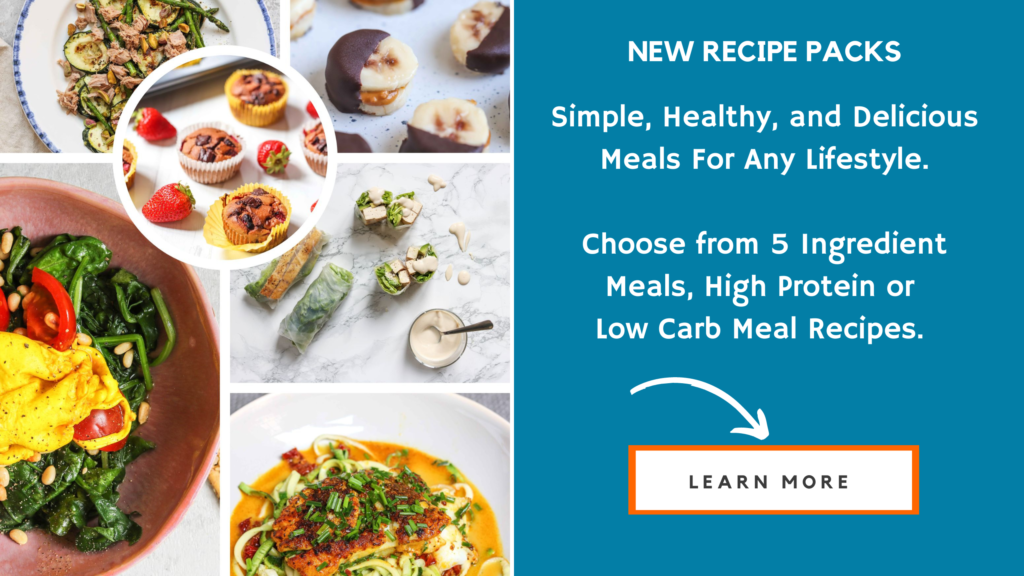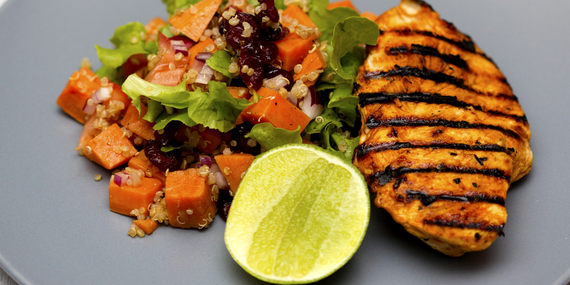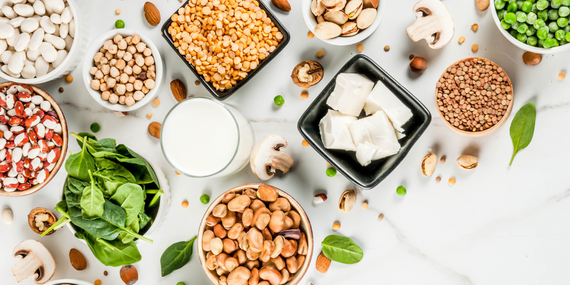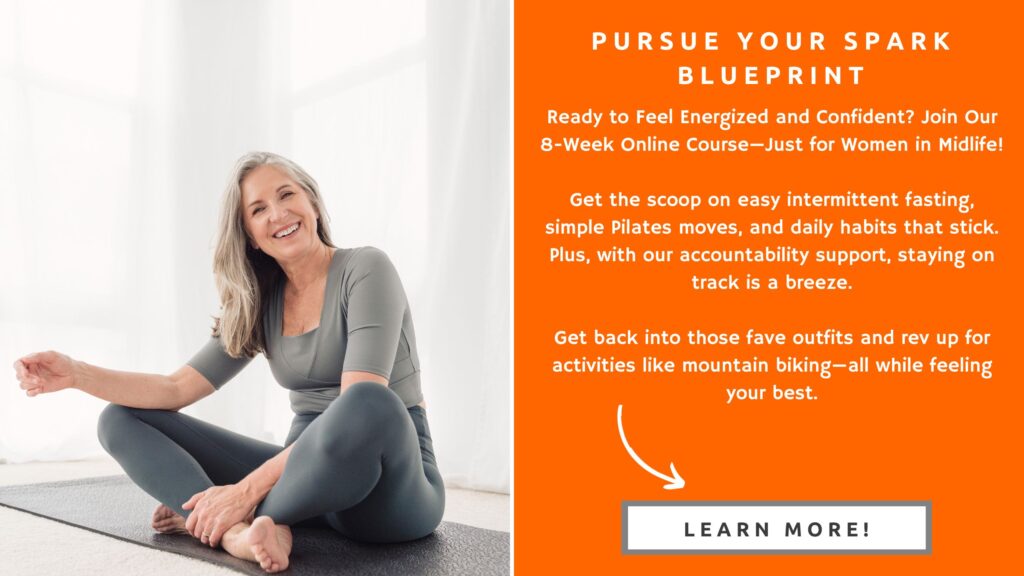Many women undereat protein and overeat carbohydrates because eating quick carbs like bread, bagels, croissants, pretzels, or protein bars is easier to carry when you get hungry. Today we’re looking into the 4 health benefits of protein for women over 50.
As we age, maintaining strength and vitality becomes increasingly important. And one key ingredient to supporting healthy aging is protein. Whether you’re a fitness enthusiast or just looking to stay active and independent as you get older, incorporating protein into your diet can make a significant difference.
Protein is crucial for repairing and building tissues, supporting a strong immune system, and maintaining muscle mass. In fact, as we age, our bodies become less efficient at processing protein, which makes it even more important to ensure we’re getting enough.
In this article, we’ll explore the benefits of protein after 50 and how it can help you maintain strength, mobility, and overall well-being. We’ll discuss the different sources of protein, such as lean meats, dairy, fish, legumes, and plant-based options, as well as how to incorporate them into your meals.

So, if you’re looking to age strong and embrace the golden years with vigor, read on to discover the power of protein and how it can unlock a world of benefits for your health and well-being.
Why is it important to eat protein? What are the health benefits of adding more protein to your daily meals?
4 Health Benefits Of Protein For Women Over 50
Getting enough protein is essential for your overall health. Starting at around age 35, Sarcopenia can set in, defined as age-related involuntary muscle loss and occurs at a rate of 1-2 percent a year for the average person.
After age 60, it can accelerate to 3 percent a year. In addition, evidence suggests that skeletal muscle mass and muscle strength decline linearly, with up to 50% of mass being lost by the 8th decade of life, according to a publication by the NIH. Therefore, eating adequate amounts of protein will reduce the impact of muscle wasting.

What are proteins made of?
What we think of as “protein” is a large category of molecules. Proteins comprise hundreds of smaller units called amino acids attached in long chains. Twenty different types of amino acids can be combined to make a protein. Proteins can also be utilized as energy; however, they are not the primary choice as an energy source. For proteins to be used by the body, they need to be metabolized into their simplest form – amino acids in a polypeptide chain.
The body can make some amino acids called essential amino acids. There are nine essential amino acids in total, some of which include leucine, methionine, and tryptophan, and you get those through your diet.
Nonessential amino acids include alanine, arginine, asparagine, aspartic acid, cysteine, glutamic acid, glutamine, glycine, proline, serine, and tyrosine.
While essential amino acids are important for muscle growth and repair, nonessential amino acids play a role in immune function and energy production. Nonessential amino acids can also be converted into glucose, which the body uses for energy.

How to choose your protein?
The healthiest protein options are plant sources, such as soy, nuts, seeds, beans, and lentils. Alternatively, animal sources (i.e., eggs, milk, lean meats, fish, and poultry) provide the highest quality rating.
All dietary animal protein sources (chicken and beef) are typically considered complete proteins. That is a protein that contains all of the essential amino acids. On the other hand, proteins from vegetable sources are incomplete because they generally lack one or two essential amino acids. Therefore, vegetarians need to eat a variety of vegetables, fruits, grains, and beans to get all essential amino acids.

What about the benefits of protein powder?
When you’re pressed for time and unable to prepare a meal, protein powders can be super helpful. A good variety of protein powders from egg, Whey, Casein, and others that work for your nutrition needs and taste are available.
Protein powders also make it easy to add to smoothies, energy balls, or yogurt to add more protein to your meals, increasing your protein intake.

Here are some things to look for when purchasing protein powder:
- About 200 or fewer calories per serving
- 2 grams or less of saturated fats (coconut oil, palm oil, palm kernel oil)
- No trans-fat or partially hydrogenated oils (these oils increase your bad cholesterol and reduce your good cholesterol)
- 5 grams of sugar or less
Read the labels of your protein powder so that you get the best quality protein powder for your body.

How much protein do women over 50 need to stay healthy?
One of my clients asked me. “Heike, how much protein should I eat, and how do I measure my protein intake?”
How much protein is ideal for women over 50?
The amount of protein you need depends on age, activity level, and overall health. The recommended dietary allowance to prevent deficiency for an average sedentary adult is 0.8 grams per kilogram of body weight. For example, a person who weighs 165 lbs, or 75 kilograms, should consume 60 grams of protein.
But once you reach age 40 – 50, your protein needs need to increase to about 1 – 1.2 grams per kilogram or 75/90 grams per day for a 75-kilogram person.
For additional resources, see: Boost Your Energy With Nutrition Strategies For Women over 50

How to track your protein intake?
Tracing your protein can be more complicated than it needs to be. But using an app like MyFitnessPal can be helpful. I recommend it to all my clients and in my courses, or try the hand method!
The Hand Method!
- 1 serving of protein is the palm of your hand – you’ll have one for lunch or dinner
- 1 cupped hand (nuts, seeds)
- 1 thumb length (avocado, oil, and fats)
This method is simple to track your daily protein intake without too much fuss. The general rule of thumb…eat protein with EVERY meal!
How to measure your protein powder? 1 Serving of protein powder (usually 1 scoop)

4 essential reasons why women need to add more protein over 50
Aside from supporting muscle growth as we age, there are several important reasons to eat enough protein, especially over 50.
- Helps maintain a healthy body weight
Adequate protein can help with weight loss. For example, in one study, participants ate either an egg breakfast or a bagel for breakfast. Researchers found that the group who had eggs for breakfast—a good source of protein—reported feeling more satisfied and less hungry, which continued throughout the day.
The more muscle mass you have, the more calories you burn, even while at rest. So, if protein helps with muscle growth, this can increase your calorie burn rate, resulting in more significant weight loss. Simple boosting your metabolism!

- Reduces Cravings
If you find yourself snacking all day or can’t stop thinking about food, it could be a sign that you’re not getting enough protein.
The American Journal of Clinical Nutrition study found that women who ate a high-protein breakfast were less likely to snack throughout the day. They also reported feeling fuller and more satisfied.
This is important to know when you’re intermittent fasting! You’ll have fewer meals and want high-quality meals with plenty of protein to help you stay full longer.
Check out: 5 Amazing Ways Intermittent Fasting Helps You In Midlife for additional resources.
It is important to note that the three macronutrients — fats, carbs, and protein — affect your body differently. Studies show that protein is by far the most filling. This is partly because protein reduces your level of the hunger hormone ghrelin. However, it also boosts the levels of peptide YY, a hormone that makes you feel full.
If you need to lose weight or belly fat, consider replacing some carbs and fats with protein. It can be as simple as making your potato or rice serving smaller while adding a few extra bites of meat or fish. For more, listen to 3 Ways to Relieve Belly Bloat, And Pilates Is One Of Them.

- Helps build muscles
Getting plenty of protein can also help you build muscle, which is key to a healthy metabolism. Low muscle mass may also make it more likely to gain weight.
Protein also helps you lose body fat. In one study, women who ate a high-protein diet and exercised regularly could lose more fat and preserve more muscle than those who didn’t eat as much protein.
Will I get more muscles by eating more protein? Unfortunately, no. But the protein you eat is the building block to the muscles you build. However, protein can’t do all the work. So strength training, whether bodyweight exercises, weights, bands, or Pilates, is essential for forcing those muscle fibers into action.

- Boosts metabolism and supports fat loss
Protein can reduce hunger and frequent snacking, leading to fewer calories consumed. In addition, eating more protein has been linked to a slightly higher metabolism, meaning you burn more calories throughout the day and even while you sleep at night.
This explains the thermic effect of food which is defined as how much energy it takes for your body to digest, absorb and metabolize the foods you eat. This thermic effect increases when a meal is more protein-based. In simple terms, you use more energy to metabolize your food and burn more calories in the process. Adding more protein to your diet can be accessible by adding a little more chicken to your salad or vegetables or a big scoop of protein powder to your shake. For more resources, see Are Store-Made Protein Shakes Healthy?

Signs of not eating enough protein
How do you know if you’re not getting enough? First, you’ll likely have cravings and struggle to stick to your meal plan.
If you’re missing crucial dietary protein, you might feel:
- Frequent hunger
- Cravings for sweet or salty snacks
- Irritable (or ‘hangry’)
- Problems with your skin, hair, or nails
- Injuries take a long time to heal
- You get sick a lot, or it takes you a long time to get over an illness
A diet low in protein might also contribute to poor sleep, altered gut bacteria, and trouble losing body fat. Check out my, Help! How Can I Stop Food Cravings? For additional resources.

What are the side effects of overeating protein?
Most research indicates that eating more than 2 g per kg of body weight daily of protein for a long time can cause health problems:
- indigestion
- dehydration
- unexplained exhaustion
- nausea
- irritability
- headache
- Diarrhea
Are very high-protein diets safe? Researchers are still determining whether very high protein diets are safe when someone is also cutting back on their carbohydrate intake.
It is crucial to balance your meals with all macronutrients, and adding a little bit more protein can make a big difference in weight and fat loss. Also, replacing your starchy carbs with non-starchy vegetables and including lean meats will make a difference in your energy and the health goals you want to reach. The Pursue Your Spark Blueprint program combines healthy and simple intermittent fasting strategies with a healthy approach to sustainable nutrition habits.

But what if you’re working out? Do you need more protein?
Protein is crucial to help with recovery and muscle growth. So if you’re exercising regularly, you’ll get the most benefits from your workout by eating enough food and making sure to replenish protein.
For example, if you weigh 150 pounds and aren’t very active, you might only need 60-80 grams of protein daily. However, if you’re an active person looking to increase muscle gain, you may need as much as 90 to 120 grams of protein per day.
Experiment with those guidelines based on your metrics. Eating enough protein is very individual, and you must remember how you feel after eating and the feedback your body gives you on the right amount of protein your body needs.
So there you have it, the 4 essential reasons why women need to add more protein over 50. Eating enough protein gives you more energy, helps you lose weight and body fat, and keeps your cravings at a minimum.

Very useful information. Thanks for sharing. Jacqui/Mummabstylish
Thanks, Jacqui this is awesome!
So much good info here! I’ve been meaning to track my protein intake as I suspect it’s low – I don’t really like meat so I’m always on the lookout for ways to add plant based sources to my diet. Xo Nipa
My SIL swears by protein powder but I’m not there yet. I have added more protein to my diet since I got sick trying not to lose those muscles that I haven’t lost already.
Rena, I believe if you can get enough protein from the foods you eat stick with that!
Very helpful information. Perfect timing for the new year re-set. Thank you for sharing these great protein tips.
Debbie, I’m glad you found my tips helpful!
Great information!
I have been a carb lover and I have been cutting the sugar and carbs and adding more protein to my diet.
Thanks for sharing these insights.
Rosemary
Rosemary, such good steps to take to better health.
Holy Cow – this is incredibly informative. I would love, love to have more of this type of information available to our Kuel Life Community as well. Any desire to expand your footprint? There are plenty of ways to re-purpose this advice and information to reach even more women. If you are game to explore, let me know.
Hi Jack, I appreciate you, and I am so glad that this information is so valuable.
Comments are closed.